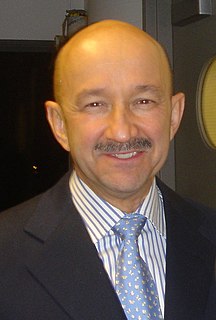A Quote by Carlos Salinas de Gortari
Globalization is a fact of economic life.
Quote Topics
Related Quotes
I think that the movement against the World Bank, against the globalization process that is happening, is very positive. We need a globalization, a globalization of people who are committed to social justice, to economic justice. We need a globalization of people who are committed to saving this earth, to making sure that the water is drinkable, that the air is breathable.
Especially now, the immigrant problem is very dramatic around the world. Because we don't know what to do with them. They're in economic crisis, and there are more and more. There will be more and more. We speak about globalization of economy, but it's also globalization for immigration. Millions of people, they're willing to have a better life. A better life, they cannot have it where they live, so they move.
Most of the time the concept of globalization ends up sounding unnecessarily abstruse - even the name itself sounds clunky and highfalutin. And people discuss it in a way that makes it seem so impersonal. But globalization really is a concrete, fundamental fact in everybody's lives, and you really see that come to life in soccer stadiums.
Almost all systems of economic thought are premised on the idea of continued economic growth, which would be fine and dandy if we lived on an infinite planet, but there's this small, niggling, inconvenient fact that the planet is, in fact, finite, and that, unlike economic theory, it is governed by physical and biological reality
The economic borderlines of our world will not be drawn between countries, but around Economic Domains. Along the twin paths of globalization and decentralization, the economic pieces of the future are being assembled in a new way. Not what is produced by a country or in a country will be of importance, but the production within global Economic Domains, measured as Gross Domain Products. The global market demands a global sharing of talent. The consequence is Mass Customization of Talent and education as the number one economic priority for all countries
The fact is that during the post-1989 heyday of globalization optimism, political and business elites did not think enough about the prospect - plainly predicted in economic theory - that trade would harm some people even while leaving society as a whole better off. The result was overpromised benefits and inadequate adjustment plans.









































